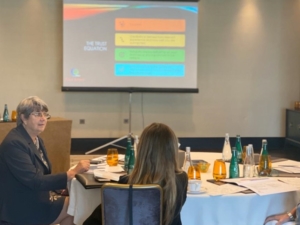Workshops
Some of the workshops that can be tailored to your needs
The Theory and Practice of Influencing
As you move forward in your career you stand on a bigger stage and what got you there will not necessarily project you forward. Technical skill, business acumen and drive are taken for granted now.
What matters next is the ability to influence, engage and inspire others to act. In short, Executive Presence and your success depends on your ability to influence others and your strategy and approach.
Workshop Objectives
To enable you to :
- Develop different approaches to hold authentic conversations
- Flex behaviours to build commitment
- Behave effectively and confidently in personally challenging situations
Workshop Content
- Definition of Influence and Persuasion
- The Climate of Influence
- Influence and Persuasion in your role
- Reasons why Influencing may fail
- Styles of Influence
- The Theory of Influence
- Persuasion Skills
Constructive Conversations
Effective communication and Executive Presence are closely intertwined.
Leaders need to be skilled communicators to navigate difficult conversations with stretched employees. It is impossible to become a good leader without being a skilled communicator. This workshop elaborates on a leaders’ best tools – specificity and clarity of language to achieve the desired results. Without that clarity, even clear messages are misunderstood and in some cases lead to conflict.
Workshop Objectives
The aim of the Constructive Conversations Workshop is to introduce practical techniques and strategies to enhance individual and team performance.
After the workshop you will be able to…
- Assure behaviour change by developing action plans and accountability
- Use a structured model for giving feedback in a positive and helpful way.
- Apply the essential attitudes or mindset that leads to resolving conflict
- Employ a model for receiving feedback in a manner that will maximize the value of feedback received
- Avoid mistakes that may result in extreme anxiety on the part of both the giver and receiver of feedback
Workshop Content
Through presentation, individual questionnaire, reflection, small group exercises, discussion and review the following will be covered…
- The illusion of transparency
- The role of ‘in the moment’ coaching
- Practical models and tips for giving feedback and managing conflict at work
- The key elements of communication
- Thomas Kilman Conflict Mode Instrument
- Recognising different styles of conflict
- Identifying the impact of different conflict styles
- Recognising preferred style/s in managing conflict and additional strategies to successfully resolve the conflict situation
- Practising giving feedback and resolving conflict
- Identifying a plan to apply to enhance communication skills in the workplace.
To learn more arrange a meeting
Leading Self and Others
Leading Self and Others means taking responsibility for your own actions and doing things as well as you can.
Leaders need to be organised and able to contribute ideas. The three key success factors are Initiative, Organisation and Accountability.
Workshop Objectives
The aim of the Leading Self Workshop is to introduce practical techniques and strategies to enhance individual and team performance.
The workshop has been designed to…
- Enable you to develop your full potential
- Use a structured model for giving feedback in a positive and helpful way.
- Apply the essential attitudes or mindset that leads to resolving conflict
- Employ a model for receiving feedback in a manner that will maximize the value of feedback received
- Avoid mistakes that may result in extreme anxiety on the part of both the giver and receiver of feedback
Workshop Content
Through presentation, individual questionnaire, reflection, small group exercises, discussion and review the following will be covered…
- The illusion of transparency
- The role of ‘in the moment’ coaching
- Practical models and tips for giving feedback and managing conflict at work
- The key elements of communication
- Thomas Kilman Conflict Mode Instrument
- Recognising different styles of conflict
- Identifying the impact of different conflict styles
- Recognising preferred style/s in managing conflict and additional strategies to successfully resolve the conflict situation
- Practising giving feedback and resolving conflict
- Identifying a plan to apply to enhance communication skills in the workplace.
To learn more arrange of meeting





